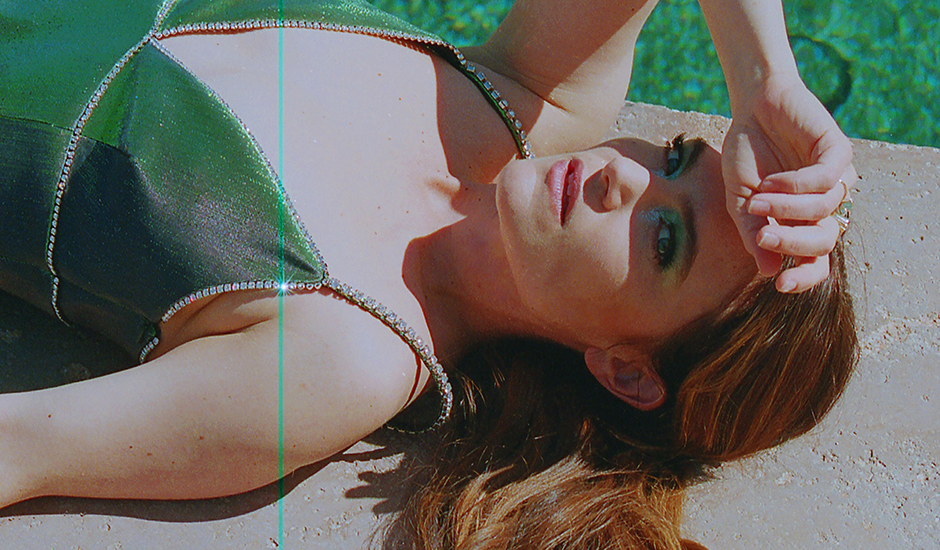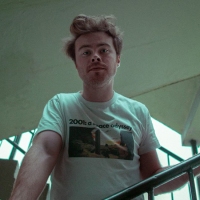 Listen to Treat You Right, a spicy new tune from The Jungle GiantsThe Brisbane favourites continue their streak of high-class, energetic singles with yet another one.
Listen to Treat You Right, a spicy new tune from The Jungle GiantsThe Brisbane favourites continue their streak of high-class, energetic singles with yet another one.

Album Walkthrough: Julia Stone dissects her defining new album, Sixty Summers
The Australian musician's first solo album in nine years is a mix of emotive subtlety and daring hooks alike.
Header image by Brooke Ashley Barone.
For some, Julia Stone's presence as a musician extends only as far as being one-half of Angus & Julia Stone; a fair although inaccurate observation, considering the brother-sister duo are one of the country's highest-selling and most acclaimed artists. There's no real other way to put this, however: those that only recognise Julia Stone for her work with her brother are severely missing out.
As a solo musician, Julia Stone is responsible for some of indie-pop's most enchanting moments, spread across the last decade. Her 2010 debut album The Memory Machine is a subtle blend of emotive lyricism and rich folk music, while her second album two years later - By The Horns - was a more aggressive and rockier spin on her work, inspired from a relationship's end. Since then, Julia's career blurred with the blossoming of Angus & Julia Stone, the pairing releasing two further albums - the self-titled #1 Angus & Julia Stone and 2017's Snow - in the time between By The Horn and Julia's next major work.
Last year, however, things began to change. She signed with BMG in a hint of material to come, and began teasing new material through a collaboration alongside Garrett Kato, and a cover of Midnight Oil's notorious Beds Are Burning. Then, came Break, her first major single in eight years and somewhat of a reinvigoration for Julia Stone, bidding her return with a powerful, more pop-centric sound that carried her typically quite detailed songwriting into a new era.
Today arrives Julia Stone's third solo album Sixty Summers, and with it, arrives a reshaped Julia Stone, one that feels ready to take on the world. It's a reassured and confident record, building on a lifetime of memories and experiences and condensing it into a mix of powerful and subtle pop music, shaped alongside collaborators like Matt Berninger from The National and St Vincent. There are qualities of Julia Stone's past work embedded within its core - like the touching, and often-wrenching lyricism that continues to shape Julia's sound a decade later - but for the most part, she sounds like a new being; Sixty Summers almost being a re-introduction to someone you thought you knew.
If Sixty Summers is a re-introduction to Julia Stone, it's one that paints her as her greatest self, invigorated by the heights of pop music's underlying power. The album switches between moments light and dark, united by Julia's craft and the detail that occupies even the most subtle moments of the record. Take, for example, the contrast between the album's title-track Sixty Summers - a windswept pop moment inspired by memories of summer's past - and We All Have, its tender and previously-released collaboration with Matt Berninger.
There's an almost-swagger like confidence amongst Sixty Summers too, one that feels partly inspired by Julia Stone's connection to the grander heights of pop music - one that she hasn't explored too heavily in the past - and by the album's shaping alongside Annie Clark, who as St Vincent, has become somewhat of a trademark to guitar-pop's most powerful and swagger-filled moments. "Jules is the best," says Annie Clark on working with Julia Stone; her name spread across the production credits on the record. "We were always fond of each other from afar, but after working on this, we became great friends. She's a brilliant woman — tenacious, perfectionistic, so smart. All fire."
All fire indeed. Take a listen to Sixty Summers below, and underneath, read Julia Stone's track-by-track walkthrough of the album, where she breaks down its creation and themes one song at a time:
BREAK
Break is a song about being at the mercy of something. A feeling really. How you can be pulled into someone or something just by being near it. The song is about trying to go with that feeling. And the song, the music, is a fun version of that sonically. Like you get pulled along by the rhythm and groove of the song.
Features the amazing contributions from Stella Mozgawa (Warpaint), Bryce Dessner (The National), and Annie Clark (St. Vincent, who also produced Sixty Summers). Each person who played on this song brought something distinctive. It was one of the early songs I wrote with Thomas Bartlett. He’s an extraordinary person to co-write with. He brought out the weird and wonderful parts of me.
SIXTY SUMMERS
Sixty Summers is a tale inspired by a time in my early twenties when I would spend summers with my friend in the town where I grew up in Sydney. Feeling the visceral elements of the Australian summer — the smell of salt water, sunscreen, mangoes and dead Christmas trees. In the throes of youthful wonder and joy at a party one night, Jessie, my friend turned to me and said, “Can you believe we’ve only got sixty summers left?!”
When I told Annie that story. She said, “That’s the song, write about that…” Thinking of life in seasons made it feel short… summer comes and goes. I wanted to explore a song that went into the idea of not wasting a moment. Do we waste it trying to grapple for more money and comfort, or do we live to make each other happy?
I love Annie’s backing vocals on the chorus. The final build was important. To take it to an urgent place. That realisation created in me urgency and we wanted that to come through in the song.
WE ALL HAVE
We All Have was written in 2015. I love this song. It’s a very direct song about human beings having the capacity to be okay even when you’re not okay. The potential is always there. The collaboration with The National’s Matt Berninger made the song even more tender and sweet. His voice really gave gravity to the lyrics. The beautiful deep sound. It’s also Thomas at his best. The spare piano and finger-plucked muted piano strings.
This song is about how everything transforms, and everything moves; even though you feel so shitty at one point, it might shift into something new. Love is all that we really need to be here for — not love with someone else, but love in your heart.
SUBSTANCE
This song was co-written with two friends Celia Pavey (Vera Blue) and Dann Hume. It’s a story about falling for someone who is disingenuous in their interest. When all you’re looking for is Substance. When we were writing it, we all resonated with that experience. “You invite me to a party and introduce me as a friend."
The song went on a real journey. Started out with an entirely different feel.
DANCE
Although the video for Dance is uplifting and about finding love, the meaning of the lyrics and song is bittersweet. The song is about accepting that love is coming to an end. Perhaps even knowing from when it began it would end but enjoying that dance regardless.
FREE
A very summer song. A song about finding a love that is extraordinary. Completely intoxicating and takes over your whole body. I wrote this with Meg Mac and Dann Hume over a summer in Melbourne. The electric guitar solo from Annie, is one of my favourite moments on the record. It’s truly electric.
WHO
Was a song that transformed the most on the record. It started as acoustic guitar and piano. It was the song that I was the most surprised by and I think probably most people will be surprised by. Thomas and I had been living with the original version for a couple of years by the time Annie heard the tune. She almost immediately thought this should be a dance track. I’m so happy she heard that. I love this song to dance to.
FIRE IN ME
I wrote about that feeling about the part of you that can do anything. That strength, that fire, that energy to do and to change. It’s very glam rock. It’s that fire in your belly song — the ability to be, or do, anything one wants. The strings on the song that Thomas arranged really took it into a ‘Bond’ like world. Whilst the rest of the song is just pure energy.
EASY
Easy is about being with someone you deeply care about but not being the right person for them. I wish that I was easier for you.
The sound of the song feels easy but it’s a sad song. The verses from Easy were originally sung. The melody from that original verse now sits pitch-shifted up and dancing above the spoken word verses. After I used spoken word on Dance, it felt that Easy would also benefit from a more direct telling of the verses. But we all missed the melody. So, Thomas took the original verse vocal and placed it above the speaking. I love how this effect works.
Also, a beautiful feature from Annie on the bridge harmony vocals. Truly magnificent her voice.
QUEEN
Queen is a strong track for me. I remember writing this when I had pretty low self-worth and was happy picking up whatever scraps were lying around. It was a real light bulb moment. Oh, I don’t need that. It’s wild how easy it is to forget. It’s about selling yourself short. Realising that you don’t have to feed off the scraps of other people’s love to survive.
I loved the imagery of the song. ‘I’m dressed like a queen begging in the streets.'
HERON
Beautiful fretless bass playing inspired by Jaco Pastorius… the song is very sexy. A very deep and base emotion.
UNREAL
The darkness of Unreal has a hidden sweetness to it. I wrote this song for Thomas one night at his studio in New York when he left me for a couple of hours. I wanted to give him something when he got back. I was so happy in his space, so at home. Making sounds, being in the studio… just having the experience for the fun of it.
The song transformed over time whilst we worked on it together. It started to speak, with all its alien sample sounds to the experience of feeling isolated in a relationship. Like you feel like you can never quite be real and be yourself.
I AM NO ONE
I wrote this song over ten years ago. It has lived with me, but I didn’t have a home for it. Had a recording of it from years back but I wasn’t in love with it. In the winter of 2019 in New York, Sam Amidon, Leigh Fisher, James Gilligan, and Thomas Bartlett were in the studio with me making a Christmas record. We recorded some original songs as well during those weeks. This song came to life. The pedal steel is so beautiful… the way it felt. Felt good to end a summer record with a winter song.
I Am No One is When you have let someone down, let yourself down. and you really, in that moment don’t matter or exist. It was very me to end on a sad note.
 Listen to Treat You Right, a spicy new tune from The Jungle GiantsThe Brisbane favourites continue their streak of high-class, energetic singles with yet another one.
Listen to Treat You Right, a spicy new tune from The Jungle GiantsThe Brisbane favourites continue their streak of high-class, energetic singles with yet another one.
 Listen to an existential new single from Albert Salt, Think It's Time To Get A JobOn his new single, Melbourne indie-pop artist Albert Salt digs deep into a crisis of creative confidence and emerges with a glistening slice of sobering pop
Listen to an existential new single from Albert Salt, Think It's Time To Get A JobOn his new single, Melbourne indie-pop artist Albert Salt digs deep into a crisis of creative confidence and emerges with a glistening slice of sobering pop